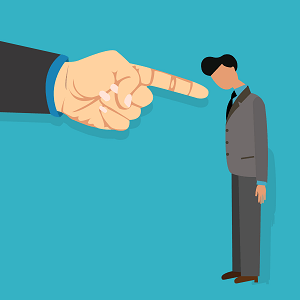From Forbes, Alice C. Walton writes, “And as most people who have dealt with depression know, good treatments are hard to come by—but they do exist. Part of the issue is that a given treatment may work for one person and not the other, and it may take several tries before the right therapy, or a combination of therapies, is arrived upon. Here are some of the methods that have been shown to work, and are worth considering. As always, finding a therapist you trust and connect with is often the first step to figuring out which route to take.” Read the rest of her article here.
Tag: law students
SHUTDOWN: WHY PEOPLE WITH DEPRESSION FEEL SO NEGATIVE
Depression is a state of shutdown in which an individual’s psychological system shifts toward negative feeling states and diminishes the positive feeling states. The hallmark features of a depressive episode is a high negative mood state (characterized primarily in terms of depressed/demoralized/defeated/despairing feelings and secondarily in terms of anxiety, irritability/defensive hostility, and guilt/shame) and a diminished positive mood state (loss of interest, pleasure, energy, desire, and excitement).
Why do people get depressed? The primary reason people enter depressive shutdowns because they cannot obtain the necessary psychological nourishment needed to energize their behavioral investment system. Think of it as being akin to a state of starvation, only instead of physiological nutrition, the individual is lacking psychological nutrition. What is psychological nutrition? The fundamental principle that underlies psychological organization is that of behavioral investment. The psychological system is organized to direct mental energy and action toward investments that offer a return on those expenditures. When one is a getting a good return on one’s investments, then one feels fulfilled, energized and engaged. However, when one is not getting a good return, one begins to feel frustrated, anxious, irritable, or disappointed. If one cannot find an effective pathway for getting one’s needs met, one begins to enter into a state of psychological shutdown called depression.
So what are the core psychological needs that people have that need to be nourished? There are many different possible classification systems of needs (and motives and goals that people seek fulfillment around, see, e.g., here). I offer five categories here that overlap loosely with Maslow’s classic hierarchy of needs.
Safety and Security Needs. First and foremost, the psychological investment system is concerned with basic safety and survival. If one’s physical safety is chronically threatened, if one is in constant pain, if one is chronically hungry, and so forth, the attention of the system will largely be focused here.
The Base Pleasures. Good sex, tasty food, relaxing on a warm summer day on the beach after working hard. The “hedonic” pleasures serve as a fundamental reward and signal positive investments (at least in the short term). Good investment systems are generally characterized by meaningful effort and hard work toward a productive goal, followed by short periods of relaxing and enjoying the base pleasures.
Relational Needs. Our core psychosocial need is to be known and valued by important others. Most notably, this includes being known and valued by members of our family of origin, friends/peers, romantic partners, and community. Needs for relational value are reflective of one’s degree of social influence. And folks go about achieving social influence and relational value in different ways. For example, see here for power and achievement needs relative to belonging and intimacy needs.
Developmental Growth Needs. We can think about an individual’s psychological system as being akin to an investor’s portfolio. An investor has resources that have the potential for growth and loss. An investor with a diverse portfolio whose investments are growing in a way that is exceeding expectation is flourishing. The same is true for an individual. Each individual will have “personal projects” that are engagements they are involved in that afford opportunities for growth (hobbies, interests, creative and playful endeavors, meaningful work projects, etc.). If an individual is chronically stuck and not growing or is largely cutoff from their growth pathways, or is frequently failing to meet expectations, or is deeply investing in pathways based on extrinsic reasons that are not consistent with their underlying emotional/motivational needs (or intuitive sense of potential), then the investment system is vulnerable.
Existential/Transcendental/Virtuous Needs. Adult humans are meaning-making creatures that need to have a narrative for how their lives and personal projects make sense. As Victor Frankl notes in his timeless classic Man’s Search for Meaning, if they cannot place their suffering, personal projects, virtues and relationships in the context of a larger narrative that provides meaning, then they will be vulnerable to developing a nihilistic attitude, which is the belief that their lives or actions really don’t matter, because really nothing matters. A nihilistic narrative can undercut the emotional value that folks get from engaging in such projects, leading to existential crises or depressions.
Why do people have trouble getting their psychological needs met? Sometimes the answer is obvious. For example, consider the city of Aleppo in Syria. The people of that city have been completely brutalized and many folks there undoubtedly feel depressed. (As an interesting aside, it is worth noting that the field of psychiatry/clinical psychology is divided as to whether such individuals should be considered “clinically depressed”). In other obvious cases, folks get depressed because of chronic pain or illness, or death of a loved one or because they get addicted so substances that ruin their lives or because they are abused or isolated.
Other times the issue is much more complicated. Consider that there are many people that live in nice houses and seem to be surrounded by caring people and are achieving in their lives, yet they also get depressed. Indeed, despite the fact that we have more and more technology and more and more resources and control over our environment, we seem to be struggling more than ever with feelings of depression and anxiety. What is going on in these cases?
The short answer is that I think the modern, fast-paced society is placing many new, unusual stressors on our emotional system. And I don’t think people have been well-educated about how to appropriately process negative feelings. People have been given much more freedom to acknowledge negative feelings than in past generations (read this story to see what I mean), but there has not been good education on how to learn and grow from such feelings (see here or here). What I see in my clinic is that individuals try to avoid negative feelings, and wish everything would just be fine. They often try to act publicly like everything is fine, but they have no idea how to maturely process and learn from their negative feelings. Instead, they enter into an intra-psychic battle with their negative feelings, often working to banish them, or criticize themselves out of their feelings or try to “stay positive”. This creates a powerful “split” in their psychological systems. Namely, their feeling system is sending one signal, their internal narrator is in conflict with that signal, and they are trying to publicly present a totally different image than their inner conflict. All of this sets the stage for a “neurotic breakdown”.
In addition, I see many parents who value their kids, but who do not know how to guide their children in processing negative feelings. Instead, too many have been caught up in “self-esteem nation” and act in an overprotective way, essentially communicating both that their kids are fragile and that others are responsible for keeping you happy. Another group teaches their kids to repress and minimize their feelings. I am not blaming parents here. The modern world is complicated and psychologists and psychiatrists have generally not done a great job being clear about the nature of emotions and relational needs.
At the societal level, we need to recognize both the dramatic changes the information technological revolution has brought to our world and how many of the institutions that provided guidance for the good life are breaking down. Religious systems have lost much of their authority. The political system has broken down into a polarized way. I think our educational system is broken in the way it assesses performance and fails to teach character values. Science often seems to characterize the world as an amoral, meaningless physical system. In other words, in terms of our existential/transcendental understanding, there seems little that supports the deep-seated need that many people have for true meaning making. So, we live in a fast-paced, high-stress world in which we are overloaded with choice, we regularly observe massive amounts of inequity in power and resources, we give lip service to negative feelings but often characterize them as disease states and provide very little real education about human emotions and needs, and institutions that provided deep meaning making systems have lost their authority.
The bottom line is that depression arises, in most cases, when people do not receive the necessary psychological nourishment from their investments. This arises because of brutal environments and injury from traumas, diminished capacities to meet growth expectations, intrapsychic and interpersonal conflict with important others. Unable to find a path forward folks shutdown and, unfortunately, getting depressed in modern society likely creates more problems than it solves. So folks get trapped in neurotic depressive cycles.
There is clearly no easy fix, as depression is a massive health problem. But I do believe there is much that can be done. We need (and can achieve) a much better shared understanding of human psychological needs and nourishment. We also need a clear recognition from institutions like the World Health Organization that depression emerges as a function of psychological malnourishment, rather than being brain disease stemming from neurological malfunctions.
My ultimate vision is for the development of a holistic meaning-making system that harmonizes the natural sciences, the social sciences, and the humanities in a way that affords an understanding of our human natures such that we can have a more effective guide toward fulfillment during these rapidly changing times.
Gregg Henriques, Ph.D., author of A New Unified Theory of Psychology, directs the Combined Clinical and School Psychology Doctoral Program at James Madison University. He is a licensed clinical psychologist with expertise in depression, suicide, and the personality disorders. He has developed a new meta-theoretical system for psychology articulated in many professional journals and is now applying that system to researching well-being, personality, and social motivation, and he and his students are working on the development of a general system of psychotherapy. Henriques received his M.A. in Clinical/Community Psychology from UNC-Charlotte and his Ph.D. in clinical psychology from the University of Vermont. He also completed several years of post-doctoral training at the University of Pennsylvania under Aaron T. Beck exploring the effectiveness of various cognitive psychotherapy interventions for suicide and psychosis. Henriques teaches courses in personality theory, personality assessment, social psychology and integrative adult psychotherapy.
Big Law Tackles Mental Health Crisis Issues With On-Site Programs; Is Its Business Model at Fault?
The ABA Journal report that Big firms have long been reticent to openly address addiction and other mental-health problems, despite research showing lawyers face higher rates of substance abuse, depression, and suicide than the wider population,” the article says. “Law firm leaders say the need to keep up appearances in a competitive industry has contributed to the resistance. That attitude, however, is slowly changing. Read the article.
Finding Motivation Even Through the Apathy of Depression
From Esperanza magazine, blogger Margaret Lanning writes, “Lack of motivation is probably the most difficult part of depression I continue to wrestle with. Trying to figure out how to get up and get moving is extremely challenging. It can make or break a day. When I feel apathetic, my senseless thought cycle starts with the notion that I need to choose to do something (clean the kitchen). Then comes immediate resistance (I don’t want to clean the kitchen), then the guilt trip (good mothers clean kitchens so the family can be healthy), then the compromise (I can have a bite of chocolate if I clean the kitchen), then the shut-down (but I still don’t want to clean, and I’ll probably eat the whole chocolate bar), then the self-punishment (I am a bad person because I’m still sitting here).” Read the blog.
Inside the Los Angeles Clinic That Uses Ketamine to Treat Depression
From LA Magazine. Advocates are hailing ketamine therapy and its attendant hallucinations as the ultimate brain hack. Prominent doctors and even the stodgy National Institute of Mental Health have championed the treatment as a powerful weapon in the battle against depression, one that could potentially prevent people from taking their own lives. Read the article.
The Strategies That Science Actually Shows are Effective for Depression
From Forbes magazine. As most people who have dealt with depression know, good treatments are hard to come by—but they do exist. Part of the issue is that a given treatment may work for one person and not the other, and it may take several tries before the right therapy, or a combination of therapies, is arrived upon. Here are some of the methods that have been shown to work, and are worth considering. As always, finding a therapist you trust and connect with is often the first step to figuring out which route to take. Read the article here.
Depression Undercover: A Trial Lawyer’s Secret
Once upon a time, I was a trial attorney at a personal injury defense firm. I was good at it. I always pushed hard; always did the best job possible. I won a good share of cases, and, of course, lost a few as well. I was valued highly enough to be made a partner shortly after joining the firm.
But I had a dirty little secret. I had bipolar disorder, which was well-controlled through a close partnership with a good psychiatrist. Still, in my mind, if word ever got out, my employers would see me as weak, a liability. To a degree, I understood. If the insurance companies that paid the bills learned that one of the firm’s trial attorneys had such a condition, their mandate would be clear: if you want our business, get rid of him. That is what I assumed.
Throughout my career, colleagues would make offhanded remarks about someone “not taking his medication.” I would grit my teeth and ignore it.
Instead, I was able to construct an alter-ego, the “happy warrior.” I had a smile on my face and a sardonic remark ready on cue. But I went about my daily business feeling like a secret agent in a Cold War spy movie. If my cover was ever blown, I was certain that my career would be at an end.
Over time, maintaining this secret identity while dealing with the usual strains of trial practice gave rise to a growing depression. Yet I still performed at a high level and still got results.
Although I had a close friend at the firm, another partner, he would deflect when I tried to talk to him about my depression, so I stopped. I began to worry that others at the firm might know about me.
Fear and the sense of isolation only fed upon themselves in a continuous cycle. I finally experienced a severe episode of depression that led to a period of disability. When I told my boss what was going on, he expressed genuine surprise that I was suffering from depression at all.
When I returned to work, I felt better, but I remained wary. Instead of engaging in a conversation about what had happened, we all acted as though nothing had occurred. The computer was rebooted, and business continued on as usual. I went back undercover, and no one seemed to mind.
Simply due to scheduling conflicts and adjournments, it was some time before I tried another case. I admit that I was a little nervous, but I was having no trouble handling my case load. I was puzzled when my boss came into my office one afternoon as I was preparing for the trial. He asked me if I felt good to go. He had never done that before. I said, “yes,” because I felt perfectly up to the task. I never asked myself, “If he is worried about my performance, why is he even letting me try the case?”
At trial, the insurance company sent an adjuster to audit the proceedings, a routine procedure. I knew him well, and he had an excellent grasp of the case, even though he had not been involved before trial. We had constant discussions about what was going on, and we seemed to be in sync. Suddenly, the insurance company pulled my old friend off the case and replaced him with a mid-level manager who consistently praised my performance.
The case went to verdict, and the jury awarded somewhat less than what the insurance company had offered settle for. To preclude the possibility of an appeal, the insurance company threw in a few more dollars. Case closed, on to the next one. To me, that was a pretty good result.
Was I in for a big surprise.
Shortly after the trial, year-end reviews were scheduled. I was getting ready for another trial, and I was very excited about it, so I wasn’t really paying attention to what was going on in the office. Other attorneys were getting their reviews – important because raises would be discussed – but I was never called in.
Ultimately, my case settled after much hard work on all sides, and the usual time for reviews was long past. I did start to worry then. I even made a remark to my secretary about it.
The call finally came. When I stepped into the conference room and saw every equity partner in the firm waiting for me, I knew. The spy had been caught, but what would happen?
My boss said that they waited to speak with me because they did not want to put pressure on me while I was preparing for another trial. He asked me if I felt capable of trying cases. I paused and then broke under the years of strain. I wept, and answered, “No.” Whether that “No” was true then or true now or was ever true, it was the most humiliating moment of a 20-year career.
My boss started to dissect my prior trial, telling me that the insurance company’s representative was reporting that I was doing a bad job. He even told me that the supervisor at the insurance company knew that I had depression. After the expected awkward silence, another partner suggested that “we find a creative solution” to keep me at the firm. I made some suggestions over the next few months. No replies were forthcoming. I was quietly being swept out the door. It wasn’t hard to get the message. I found another job and moved on.
The whole experience seemed to confirm everything I feared about being a lawyer with depression. Currently, I am not practicing, and am seeking other opportunities.
But if the story ends there, what is the point? Can I offer my account as a teaching opportunity? At the very heart of the tale lies the sad truth that we, as lawyers, trained to be superlative communicators, can utterly fail to make each other understood when it comes to depression. Should I have been more candid about my condition? My employers never told me what concerns they had or what they knew. Could all of us have been proactive for our mutual benefit, especially after I returned to work? I believe that there had been an opportunity to open a constructive dialogue, but my fear told me to keep my mouth shut. I cannot speak for my former employers, although I highly doubt that they held any malice. I doubt that they thought much about it at all until some critical pressure was brought to bear, whether from within or outside of the firm. Unfortunately, by the time everyone was talking, my job at a firm I loved was gone.
I miss working there. I still have close friends there. I see them when I can, which is not often enough. Just recently, I ran into my secretary, and we briefly chatted about my plans for the future. And then she said something that cut me to the quick: “You were a good lawyer.”
— Anonymous guest blog
Wiring of ‘Little Brain’ Linked to Multiple Forms of Mental Illness
Having a single mental illness like anxiety, depression or schizophrenia is hard enough on its own. But studies consistently show that up to half of people with one mental illness also experience one or more additional forms of mental illness at the same time.The high numbers of patients who suffer from multiple forms of mental illness has many researchers shifting focus away from studying individual disorders and instead hunting for common mechanisms or risk factors that might cause all types of mental disorders. Read the rest of the news here.
How Untreated Depression Contributes to the Opioid Epidemic
The Atlantic reports: “Several researchers now believe depression, one of the most common medical diagnoses in the U.S., might be one underlying cause that’s driving some patients to seek out prescription opioids and to use them improperly. People with depression show abnormalities in the body’s release of its own, endogenous, opioid chemicals. Depression tends to exacerbate pain—it makes chronic pain last longer and hurts the recovery process after surgery.” Read the rest of the story here.
Diet and Depression: Is There a Link?
U.S. News & World Report states, “If it’s true that ‘you are what you eat’ – and research is increasingly confirming that truism – then what you eat certainly has an impact on mental health. Finding a direct link between certain foods and the prevention or treatment of depression is hard, however. A cause-and-effect relationship “is a hotly debated issue,” says Dr. Steven C. Schlozman, assistant professor of psychiatry at Harvard Medical School. Read the rest of this news article here.














